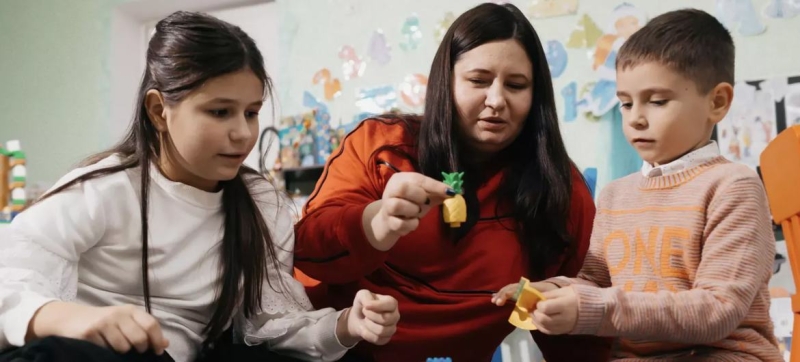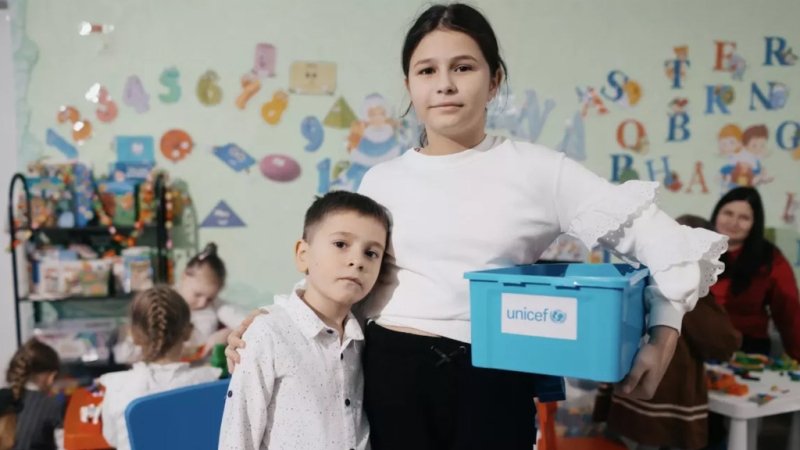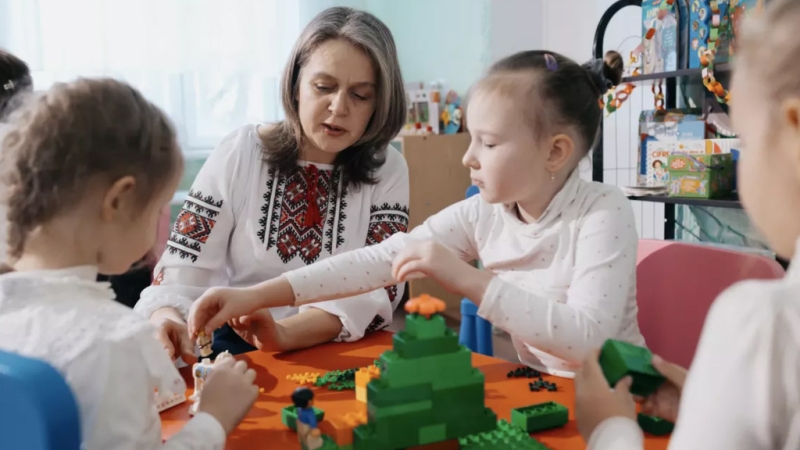
“Communication with other children, with a psychologist, and playing with LEGO develops thinking and creativity.” UNICEF and LEGO help restore mental health to Ukrainian refugee children Refugees and migrants
Eva and Misha are ten and six years old, respectively, but they already know what it means to miss home, country and native language. For two years now, they have been living in hope that the day will come when they will hug their grandparents, walk along the seashore and cross the threshold of their school, as they did before February 24, 2022 – a day that changed the lives of millions of children from Ukraine.
Eva and her younger brother are from Odessa and have been living in Balti with their mother Tatiana for about 700 days. “The war radically changed our lives. I was on maternity leave and was planning to return to work. We bought our dream house and walked along the seashore every day. However, we were forced to leave to save our children and protect them from possible psychological trauma. Of course, the noise of sirens affects the mental health of children,” Tatyana recalls about the first day of the war.
She doesn’t cry or be sad. You can see happiness in her eyes. During her two years in the shelter, she realized that only the safety of her children was important. “We cherish the peace and moments spent with family. I would like to go home, but now we have to live here.” I integrated Misha into kindergarten very easily. My oldest child is studying online, but I found it difficult. He withdrew into himself because he lacked communication. That’s why my daughter has been going to school for six months now,” says Tatyana.

Ten-year-old Eva and her six-year-old brother Misha.
Eva confirms that she misses schoolwork and communication with other peers. “Doing homework online was no fun. When you go to school, you move, communicate, learn something,” she says.
Eva wants to become a singer and misses her native language: “I like studying here, I made friends, but school in Ukraine is special because there I speak my own language language.”
In Balti, Eva takes music lessons, and her talent blossoms: “If I become famous, I will write songs and inspire people.”
After school, Eva comes to the educational playroom center created by UNICEF and its partners. Right on the territory of the kindergarten, her brother Misha continues to study and make new friends. Children from Moldova play with LEGO construction kits provided by UNICEF with the support of the LEGO Foundation. Under the guidance of teachers, children are immersed in the creative process.
The most effective way to learn is through play
“I believe that the most effective way of learning is through play. Communication with other children, with a psychologist, and playing with LEGOs develop thinking and creativity. They don’t sit at home, and they need to play, enjoy life like never before,” says Tatyana.
Activities organized at the play and learning center promote the social integration of children in need of support. Here children can learn and develop new skills that are important for easier integration into an educational institution.
Read also:
Two years war in Ukraine: millions of refugees need support
Since the start of the war, UNICEF, in collaboration with the Government of Moldova, other non-governmental partners and with financial support from the LEGO Foundation, has created 36 play and learning centers in kindergartens and community centers in all regions of the country. In addition, more than 280 kindergartens in Moldova were equipped with LEGO sets, and about 1,500 teachers in early education institutions were trained to effectively use these sets in educational activities.
Consulting psychologist Natalya is one of the participants in the learning process. She is convinced that LEGO pieces are a great help for all teachers and specialists who are called upon to ensure the healthy development of children.

Psychologist Natalya works with children.
“When the war started, the children were very tense,” says Natalya. “Some sat on stools and refused to participate, but we managed to involve them in the activities. Here we have a real LEGO island where children can be themselves. They can build whatever they want. For example, children build a time machine to see their grandmother as a child. Such activities help children feel better. If a child comes in sad, we try to find out the reason and get him out of this state. After that, he unites with other children in the construction process and forgets about all his problems and sorrows.”
Classes at the educational and play center help not only children, but also their parents . When Tatyana feels uneasy, she knows that she can talk about anything with the center’s teachers and consultants and get the support she needs. “We have everything we need to fit into the team. There is support, and we feel it. If something bothers us, the teacher always consults with us and helps us find solutions to all problems, even those related to our daily life in Balti,” says Tatiana.
Currently Currently, there are more than 116 thousand refugees from Ukraine on the territory of the Republic of Moldova, including more than 51 thousand children. Since the early days of the conflict, UNICEF has worked in partnership with authorities to ensure that refugee children have access to formal and non-formal education programmes. As a result, about 24,000 children in Moldova and Ukraine gained access to non-formal education in learning and play centers established by UNICEF.
